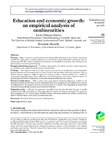Mostrar o rexistro simple do ítem
Education and Economic Growth: an Empirical Analysis of Nonlinearities
| dc.contributor.author | Márquez Ramos, Laura | |
| dc.contributor.author | Mourelle, Estefanía | |
| dc.date.accessioned | 2020-10-27T08:13:56Z | |
| dc.date.available | 2020-10-27T08:13:56Z | |
| dc.date.issued | 2019 | |
| dc.identifier.citation | Marquez-Ramos, L. & Mourelle, E. (2019). Education and economic growth: an empirical analysis of nonlinearities. Applied Economic Analysis, 27 (79), 21-45. Doi: 10.1108/AEA-06-2019-0005 | es_ES |
| dc.identifier.issn | 2632-7627 | |
| dc.identifier.uri | http://hdl.handle.net/2183/26544 | |
| dc.description.abstract | [Abstract] Purpose – Might a country’s economic growth performance differ depending on the evolution of its human capital? This paper aims to consider education as a channel for human capital improvement and then for economic growth. The authors hypothesize the existence of a threshold for education, after which point the characteristics of economic growth change. Design/methodology/approach – To address this question, the authors turn from a linear framework to a nonlinear one by applying smooth transition specifications. Findings – This empirical analysis for Spain points to the existence of nonlinearities in the relationship between education and economic growth at country level, for both secondary and tertiary education. Next, as different patterns emerge in different regions, the authors provide a regional analysis for a number of representative Spanish regions. The results show that both secondary and tertiary education matter for economic growth and that nonlinearities in this relationship should be taken into account. Practical implications – What is learnt from using Smooth Transition Regression models for the education-economic growth link is that the educational level of the population can be understood as a source of nonlinearities in the economic activity of a country (and of a region). Thus, depending on national and regional educational levels, economic growth behaves differently. Originality/value – Although the importance of nonlinearities has been identified, linearity is usually assumed in this field of the literature. This paper calls into question the linearity assumption by using time series techniques for 1971-2013 in Spain, an OECD country, and testing whether the results at country level hold for different regions within Spain as a robustness check. | es_ES |
| dc.language.iso | eng | es_ES |
| dc.relation.uri | https://doi.org/10.1108/AEA-06-2019-0005 | es_ES |
| dc.rights | Atribución 4.0 | es_ES |
| dc.rights.uri | http://creativecommons.org/licences/by/4.0/legalcode | * |
| dc.subject | Education | es_ES |
| dc.subject | Economic growth | es_ES |
| dc.subject | Nonlinearities | es_ES |
| dc.title | Education and Economic Growth: an Empirical Analysis of Nonlinearities | es_ES |
| dc.type | info:eu-repo/semantics/article | es_ES |
| dc.rights.access | info:eu-repo/semantics/openAccess | es_ES |
| UDC.journalTitle | Applied Economic Analysis | es_ES |
| UDC.volume | 27 | es_ES |
| UDC.issue | 79 | es_ES |
| UDC.startPage | 21 | es_ES |
| UDC.endPage | 45 | es_ES |
Ficheiros no ítem
Este ítem aparece na(s) seguinte(s) colección(s)
-
GI-C+D - Artigos [104]






